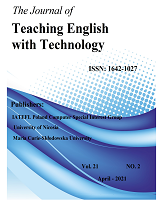MOBILE-MEDIATED INTERACTIONAL FEEDBACK (MMIF) EFFECT ON IRANIAN LEARNERS’ ACQUISITION OF ENGLISH ARTICLES
MOBILE-MEDIATED INTERACTIONAL FEEDBACK (MMIF) EFFECT ON IRANIAN LEARNERS’ ACQUISITION OF ENGLISH ARTICLES
Author(s): Thana Hmidani, Narges ZareianSubject(s): Education, Distance learning / e-learning
Published by: IATEFL Poland Computer Special Interest Group and The University of Nicosia
Keywords: English articles; Interactional feedback; Iranian learners; mobile-mediation; self-repair;
Summary/Abstract: The role of interactional feedback (IF) has been the interest of researchers in communicational context. Some studies have shown low rate of improvement following IF in a classroom setting, hence a shift to computer-assisted feedback. This study explored IF in a mobile-mediated environment (MMIF) on Telegram and compared it with in-class IF. The aim was to solve the problem of students who were unable to attend classes regularly due to family or schoolwork conditions. Forty highschool and undergraduate students of low intermediate level were randomly assigned to two groups. The experimental group attended three sessions out of six: an introductory one for pre-test and the procedure; a halfway session for face-to-face discussions with the teacher; and one for post-test and assessment of the procedure. The control group attended six regular classes. The experimental group sent their compositions online to the teacher who highlighted the mistakes and posted them to be discussed by the learners who were further divided into subgroups of five for more opportunity to participate and by the teacher who provided more feedback when needed. Data were collected from the first and last compositions produced in-class by both groups and results were compared with a focus on article use. The mixed method study revealed that MMIF is advantageous and time-saving.
Journal: Teaching English with Technology
- Issue Year: 22/2022
- Issue No: 1
- Page Range: 40-61
- Page Count: 22
- Language: English

